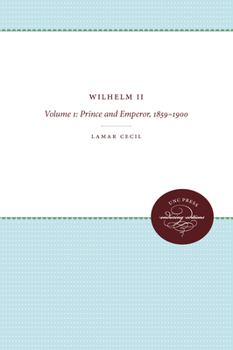Wilhelm II: Volume 1: Prince and Emperor, 1859-1900
(Book #1 in the Wilhelm II Series)
Select Format
Select Condition 
Book Overview
Wilhelm II (1859-1941), King of Prussia and German Emperor from 1888 to 1918, reigned during a period of unprecedented economic, cultural, and intellectual achievement in Germany. Unlike most European sovereigns of his generation, Wilhelm was no mere figurehead, and his imprint on imperial Germany was profound. In this book and a second volume, historian Lamar Cecil provides the first comprehensive biography of one of modern history's most powerful--and...
Format:Hardcover
Language:English
ISBN:0807818283
ISBN13:9780807818282
Release Date:June 1989
Publisher:University of North Carolina Press
Length:488 Pages
Weight:1.80 lbs.
Dimensions:1.7" x 6.0" x 9.0"
Customer Reviews
3 ratings
Good first volume on Wilhelm
Published by Thriftbooks.com User , 17 years ago
Sometimes psychologizing great players in history is a waste of time, or worse; with Wilhelm it's part of the territory. Wilhelm's relations with his mother over her Anglophilia, etc., would largely appear to stem from his childhood and the treatments for his withered left arm, contrasted with the hagiography for his grandfather, Wilhelm I, vs. the younger Wilhelm's liberalizing father, Friedrich. Cecil doesn't break any new ground here, but does have a little more detail of Wilhelm's childhood than a one-volume biography would. Where he does have more depth, not just detail, is how this affected his relations with Great Britain when he was Kaiser, and how he personalized his problems here through deliberate affronts to people such as Edward, Prince of Wales, and Prime Minister Saulsbury. Cecil also goes into details on Wilhelm's relations with his government ministers, and especially his chancellors, and how they attempted to "handle" him. I haven't read Volume 2, but have my appetite whetted.
A hostile biography
Published by Thriftbooks.com User , 18 years ago
Wilhelm II, Prince and Emperor 1859-1900, was a hostile biography. This is the first of a 2 volume series, so it ends in 1900 even though Wilhelm lived in exile in Holland until 1941. [The sequel is: Wilhelm II: Emperor and Exile, 1900-1941 (Cecil, Lamar) Publisher: University of North Carolina Press (October 1996) ISBN: 0807822833] We are led to believe that Wilhelm II was a bizarre and incapable sovereign because he didn't work hard, wasn't a good listener, was isolated from outside influences, picked associates for their loyalty, and thought that the government should be composed only of those who agreed with him. Isn't this a universal set of attributes for all government leaders? We could have assumed all of the above, and then gone looking for differences that set our subject apart from the pack. Wilhelm II considered socialists or radicals "to be criminals unworthy of his grace and favor." My guess is that the author has leftist or Anglophile leanings which were the basis for his criticisms of Wilhelm II. Wilhelm II was manly and robust, spoke frequently of religious manners, and was polite and friendly as well as very civil in social matters. Naturally, all of this would be unacceptable to a leftist. The author faults Wilhelm for being callous in his emotions, and further castigates him for not having a more compassionate feeling about his subjects-but then he also blasts him for allowing momentary impulses and personal feelings to govern his actions. So, which is it? Kaiser Wilhelm II planned to ameliorate the condition of the working class, both as a religious duty and as a bulwark against socialism. He correctly perceived that socialist dogmas were incompatible with Christian ethics and impractical in execution and ruinous to both individuals and society. And this guy is "foolish"? Industrialists were dedicated solely to maximizing profits, and exhibited no concern for the working class. Wilhelm wanted a mutually advantageous relationship between employer and worker. Wilhelm was convinced that if management did not make timely concessions, violence and socialism would result. He wanted to use the power of the crown to protect workers against unscrupulous employers. He was sympathetic to the eight-hour day. The progressive Wilhelm II wanted abolition of Sunday work unless absolutely necessary, no night employment for women and children, no work by women in the last 3 weeks of pregnancy and for a similar period after delivery, a pause in the workday for women to accomplish their domestic chores, and limitation of labor by children under fourteen. Compared with those of similar position, Wilhelm II was a benevolent and farsighted ruler. This was a very good book. Perhaps the author should read it.
An informative and enjoyable read
Published by Thriftbooks.com User , 26 years ago
History books aren't typically easy to read. This one was well written and pretty easy to follow. For someone interested in WWI or German history it would be a nice book to help with the subject.






